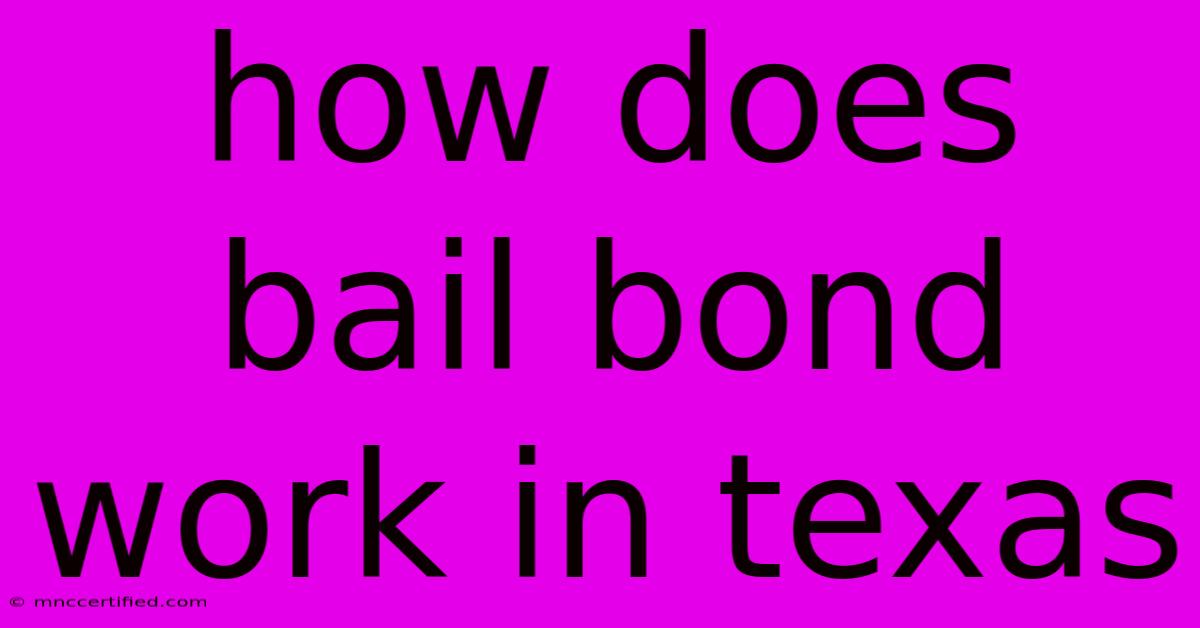How Does Bail Bond Work In Texas

Table of Contents
How Does Bail Bond Work in Texas? A Comprehensive Guide
Getting arrested can be a frightening experience, and understanding the bail process is crucial for navigating the Texas legal system. This comprehensive guide explains how bail bonds work in Texas, clarifying the process and your rights.
Understanding Bail in Texas
In Texas, bail is a financial guarantee ensuring your appearance in court. It's not a fine; it's money secured to ensure you show up for your scheduled court dates. If you appear as promised, the bail is returned. Failing to appear results in the forfeiture of the bail amount. The amount set depends on several factors, including the severity of the crime, your criminal history, and the judge's assessment of your risk of flight.
Types of Bail in Texas
Texas offers several types of bail:
- Personal Recognizance (PR) Bond: This is a release without requiring any monetary payment. It's usually granted for minor offenses and relies on your promise to appear in court.
- Cash Bond: This involves paying the full bail amount in cash. Upon appearance in court, you receive your money back.
- Surety Bond (Bail Bond): This is where a bail bondsman posts the bail amount on your behalf in exchange for a fee, typically 10% of the total bail. This is a common option, especially for higher bail amounts.
- Property Bond: Using real estate as collateral to secure your release. The property must have sufficient equity to cover the bail amount.
How a Texas Bail Bond Works
A surety bond, often just called a "bail bond," is the most frequently used method when dealing with higher bail amounts. Here's how it works:
- Arrest and Bail Setting: After arrest, a judge sets bail.
- Contacting a Bail Bondsman: You or a family member contacts a licensed bail bondsman.
- Application and Fee: The bondsman will collect information and the required fee, typically 10% of the total bail amount. This is non-refundable.
- Collateral (Sometimes): In some cases, the bondsman may request collateral, like a vehicle title or other valuable assets, to mitigate their risk.
- Bond Submission: The bondsman posts the bond with the court, securing your release.
- Court Appearances: You are obligated to appear at all scheduled court dates. Failure to do so will result in the bondsman pursuing you to ensure they recoup their losses.
- Bond Forfeiture (Consequences): If you fail to appear, the bondsman forfeits the bail amount to the court. They then attempt to collect the full amount (plus any fees) from you through legal means. This can include wage garnishment or asset seizure.
Choosing a Bail Bondsman
Selecting the right bail bondsman is crucial. Look for:
- Licensing: Verify their license with the Texas Department of Insurance.
- Reputation: Check online reviews and ask for references.
- Transparency: Ensure they clearly explain all fees and conditions.
- Availability: A responsive bondsman is essential, especially during an urgent situation.
Understanding Your Rights
- Right to an Attorney: You have the right to legal counsel throughout the bail process and your subsequent legal proceedings.
- Right to Due Process: The bail amount must be reasonable and not excessive.
- Right to Information: You have the right to understand the conditions of your release and the consequences of failing to appear.
FAQs about Texas Bail Bonds
Q: Can I get a bail bond if I have a poor credit history? A: While a good credit history can help, most bondsmen will consider other factors such as employment and ties to the community.
Q: What happens if I can't afford the 10% fee? A: You may need to explore alternative options like seeking financial assistance from family or friends or exploring legal aid resources.
Q: Can I get a bail bond for a felony charge? A: Yes, but the bail amount will typically be significantly higher.
Q: What if I violate the conditions of my release? A: This could lead to a warrant for your arrest, the forfeiture of the bond, and further legal consequences.
Navigating the Texas bail bond system can be complex. Understanding the process, your rights, and choosing a reputable bondsman are key to a smoother experience. Remember to seek legal counsel for advice tailored to your specific situation. This information is for educational purposes only and does not constitute legal advice.

Thank you for visiting our website wich cover about How Does Bail Bond Work In Texas. We hope the information provided has been useful to you. Feel free to contact us if you have any questions or need further assistance. See you next time and dont miss to bookmark.
Featured Posts
-
Loan Agreement Vs Bond Indenture
Nov 20, 2024
-
Bail Bond Business Start Up Cost
Nov 20, 2024
-
Cincinnati Shelter Aids Pets From House Explosion
Nov 20, 2024
-
Shelter Insurance Poplar Bluff Mo
Nov 20, 2024
-
James Bond Villa Del Balbianello
Nov 20, 2024